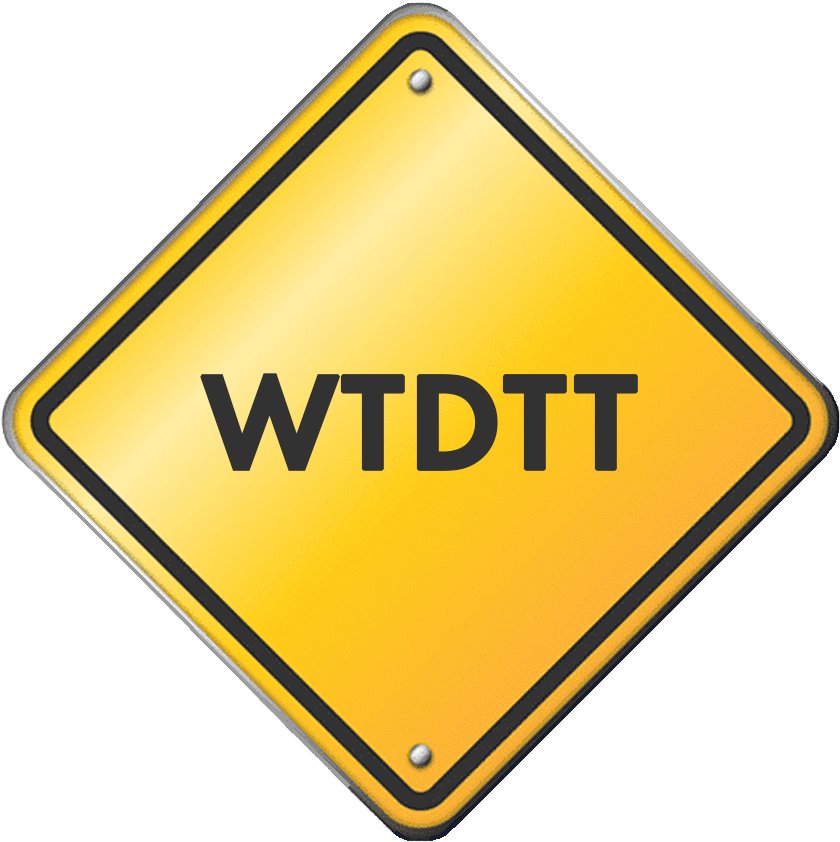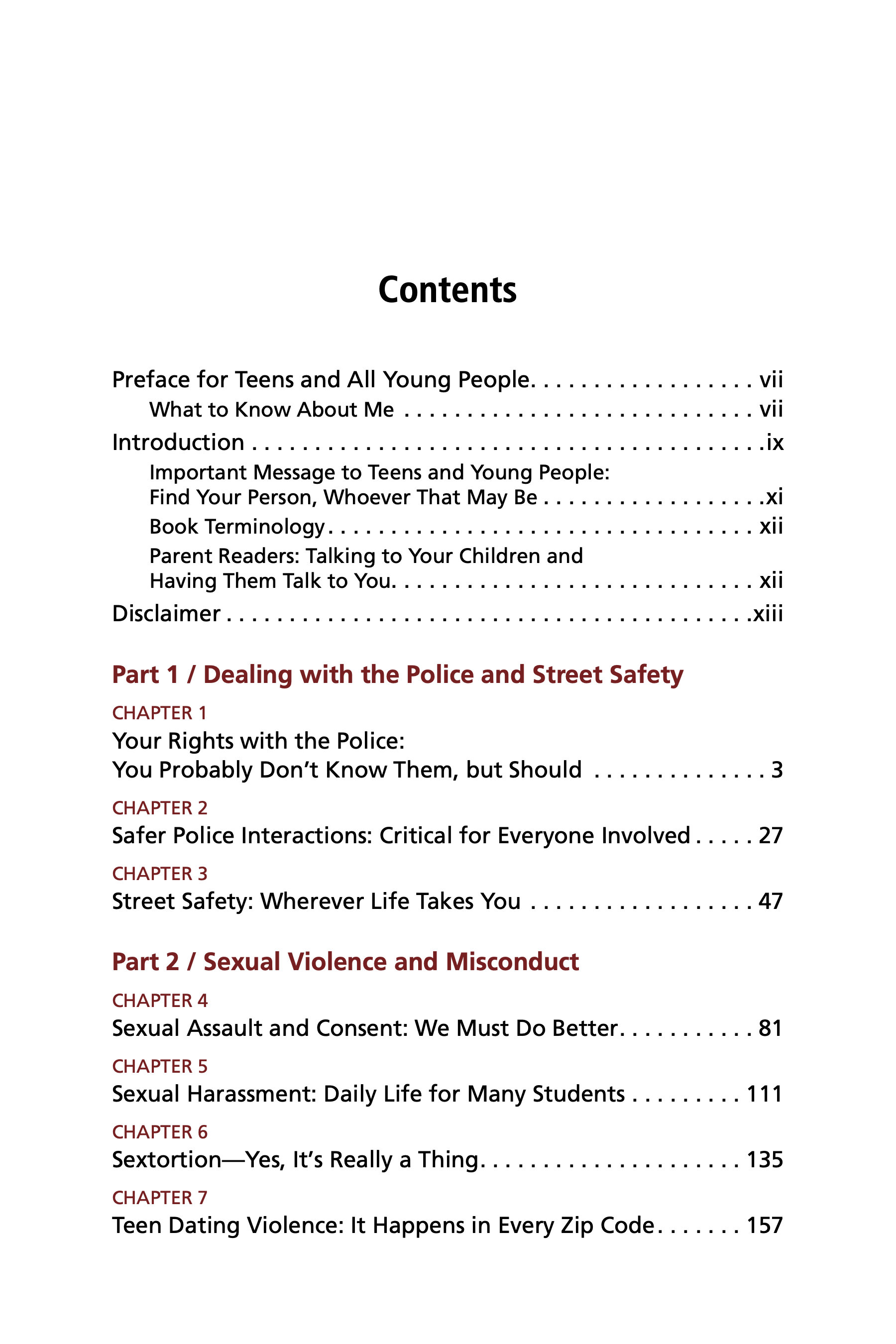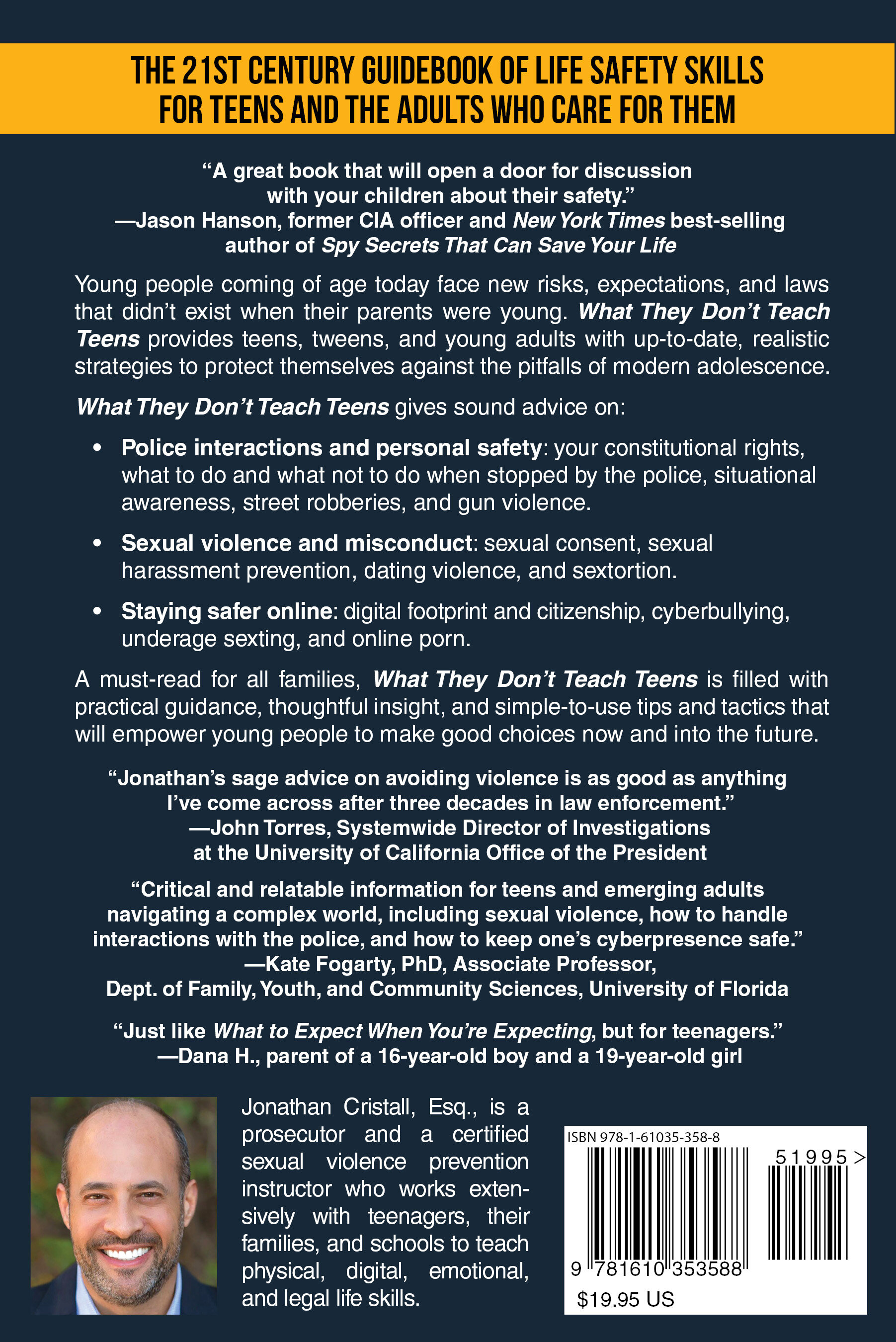About What They Don’t Teach Teens
““Cristall offers clear, compelling, and detailed guidance to help young people navigate complex interpersonal and legal situations.” ”
The 21st century guidebook of life safety skills for teens, their parents, and other caregivers, covering physical safety, sexual consent, social media, your rights with the police, situational awareness, dating violence, smartphones, and more.
Young people coming of age today face new risks, expectations, and laws that didn't exist when their parents were young. What They Don't Teach Teens provides teens, tweens, and young adults with up-to-date, realistic strategies to protect themselves against the pitfalls of modern adolescence.
Author Jonathan Cristall, once a troubled teen himself and now a veteran prosecutor for the City of Los Angeles, works extensively with teenagers and their families to teach physical, digital, emotional, and legal safety skills. Drawing on Cristall’s hands-on experience, What They Don't Teach Teens gives parents and other caregivers techniques for talking to their children about these urgent issues.
What They Don't Teach Teens gives sound advice on police interactions and personal safety (your constitutional rights, what to do/not do when stopped by the police while driving, situational awareness, street robberies, gun violence); sexual violence and misconduct (sexual consent, sexual harassment prevention, dating violence, sextortion); and staying safer online (digital footprint and citizenship, cyberbullying, underage sexting, online porn).
A must-read for all families, What They Don't Teach Teens is filled with practical guidance, thoughtful insight, and simple-to-use tips and tactics that will empower teens and others to make good choices now and in the future.
Book Testimonials
“A veteran prosecutor and youth safety counselor, Cristall is uniquely qualified to write a book about keeping teens out of trouble. Cristall starts with the assertion that teens need to find safe people to help them no matter what situation they face, and gives advice to parents on how they can fulfill this role in their adolescent’s life. The crucial legal topics are personal safety, dealing with police, sexual assault and consent, harassment, sextortion, teen dating violence, digital footprint and citizenship, data privacy, cyberbullying, and smartphone cameras. The end of each chapter contains a space for students to journal takeaways, bullet-list summaries, and take a “What Would You Do If It Happened to You?” quiz. VERDICT Easy to read and comprehensive on topics of safety, Cristall’s volume is an informative read for teens and their parents, but may also prove to be a helpful text for a high-school level health class.”
““An easy-to-read guide for teens and those who love them ... a great tool to work through alongside a teenager to talk through the information and real-world situations. This is a very valuable guide to tough topics that are relevant in the lives of young people. Highly recommended.”
”
“Jonathan Cristall’s background, experience, and writing style makes him relatable and gives his voice credibility that teens will listen to. His book kicks open the door for parents and other caregivers to have meaningful discussions with their children about incredibly important issues.”
“Interfacing with the police can be stressful and potentially dangerous, particularly for people of color and the young. Jonathan Cristall provides not only great insight for how to best interface with the police, but is candid about racial injustice. Many changes are needed with how our communities are policed. In the meantime, I highly advise all parents and their children to read this book.”
“What They Don’t Teach Teens will help prevent sexual violence in relationships, friendships, peer groups, and communities. Mr. Cristall is transparent about his own experiences and the many issues that young people face in hook up, party culture—particularly those fueled by alcohol.”
“As a parent, prosecutor, and former at-risk kid, Jonathan Cristall has a unique perspective when it comes to helping youth navigate the gauntlet that is adolescence. What They Don’t Teach Teens is a timely text that provides both parent and child alike with valuable information to identify and confront some of the most challenging teen issues of the day.”
“Jonathan Cristall’s book is designed to appeal directly to youth - to help them make healthy and safe choices, even when interacting with the police. Cristall’s approach to cyberbullying is to emphasize all of the choices teens have when they find themselves in these situations. I hope that many teens benefit from reading this book!”
“Jonathan provides critical information for teens and emerging adults navigating a complex world, including sexual violence, how to handle interactions with police, and how to keep one’s cyberpresence safe in relatable ways. An easy read with vital and useful information and advice for current and future generations. I plan to share Jonathan’s work with the young people I teach, work with in positive youth development as well as those I know personally.”
“Jonathan’s sage advice on avoiding violence is as good as anything I’ve come across after three decades in law enforcement. Although the topics are serious in nature, the book actually brings readers a sense of peace and calm knowing that they can handle unexpected events that can occur in life.”
“After five decades working in sexual violence prevention, I am so glad to see this unique book What They Don’t Teach Teens. It is deep, impactful, and clearly conveys information about sexual and interpersonal violence that no young person should be without. A remarkable achievement.”
“Our teens are growing up in a technological world that give them access to some of the greatest ideas of the world, and at the same time exposes them to the underbelly of cybercrime, harassment, cyberbullying and laws that they have never heard of. Jonathan’s book should be taught at the Jr. High and High School level across the country. He is direct and spot on with his advice.”
“It is no longer an option to come of age without the life skills so adeptly covered in What They Don’t Teach Teens. It’s not only young people who will benefit from having this information at their fingertips, but teachers, school administrators, parents, and other guardians too.”
“Mr. Cristall’s book exposes some of the most common methods perpetrators use to obtain child sexual abuse material by the exploitation of young people. His prevention techniques and tips are savvy, well explained, and will certainly keep tweens, teens, and young adults safer online and off.”
“As someone who has five kids and has been teaching safety for a living, I found this to be a great book for any parent and their teenage children. It’s a book that will open up a door for discussion with your children about their safety.”
“Students, school staff, and other caregivers in every community will surely benefit from reading What They Don’t Teach Teens. There are many great conversation starters too. An impressive accomplishment by Mr. Cristall.”
“What They Don’t Teach Teens is a wonderful way for school administrators and school counselors to start all sorts of meaningful conversations with students. A book like no other that schools (and parents) have been longing for.”
“Jonathan provides practical guidance on cyberviolence and shines a spotlight on the uniquely 21st century crime of sextortion. As a global advocate sharing the story of my daughter Amanda’s life and struggle, I so appreciate the contributions Jonathan makes to this movement. I know that parents and young people will be both safer and wiser from having read What They Don’t Teach Teens.”
“An essential guidebook that is eye-opening and just overflowing with solutions to so many of the issues that young people face. Smart, timely, and essential reading for anyone—parents, guardians, young people and teachers. As important to our children’s education as any class they will ever take in school.”
“Young people need to know what to do and not to do when stopped by the police while driving or on foot. What They Don’t Teach Teens is written in a straightforward way that makes it imminently accessible to young people. Mr. Cristall’s counsel is balanced, authentic and provides information that we all want our children to have.”
“What They Don’t Teach Teens is an essential tool for young people, parents and guardians in navigating the rocky terrains of street and digital safety, and sexual violence. Drawing on the voices of internationally recognised experts in their fields, Jonathan Cristall provides informed, non-judgemental and inclusive advice, and strategies for approaching what are often difficult conversations.”
“Finally, a sourcebook covering the class that no school offers: what it takes to grow up safely in today’s world. Jonathan Cristall combines his experience as a risk-taking kid, his years of expertise as a prosecutor, and his warmth as a dad of three teenagers to open the eyes of Gen Z-ers and their parents.”
“This book helps tweens, teens, and young adults appreciate the importance of their digital footprint and how to be good digital citizens. It is just bursting with compelling information about social media and the use of digital technologies that all young people coming of age today must know.”
“What They Don’t Teach Teens is a current, informative and easy-to-read guide addressing issues of interest to youth, parents and guardians alike. With our attention focused on the #MeToo and Black Lives Matter movements, and the ubiquitous digital phenomenon of cyberbullying, an understanding of applicable laws is essential. Jonathan Cristall has excelled in providing such in this book.”







